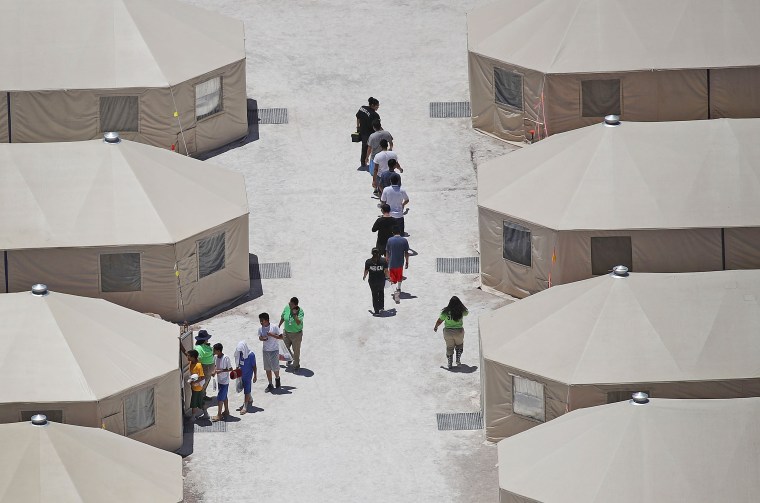TORNILLO, Texas — An emergency manager at a Texas detention facility housing hundreds of migrant children in a tent encampment said Monday that the separation of families resulting from President Donald Trump’s policies “should have never happened.”
"This shelter would not have been necessary without the separations," the emergency manager, who spoke on the condition of anonymity because he was concerned for his safety, said during a media tour of the facility. "The crisis was a result of the decision to separate the kids. The separations should have never happened."
He added: "The process is flawed and it harmed the children. I would like to never do this mission again."
NBC News was part of a group that went into the Tornillo detention facility and saw firsthand what life was like for unaccompanied and separated children. Cameras and cellphones were not allowed inside.
The facility holds 326 kids aged 13 to 17. Most are boys, but the facility also holds 14 girls in separate tents. Of the children held there, 117 children are from Honduras, 40 are from El Salvador, 162 are from Guatemala and three are from Mexico. Four others include one Romanian teen and one Nicaraguan.

The boys’ sleeping tents had five bunks on a side and 20 to a tent and resembled a barracks. The beds were neatly made and everything was labeled in military jargon, with the tents labeled Alpha 1, Alpha 2, and so on. There are 22 tents in this facility, with two set aside for girls.
The schedule for the day was labeled “battle rhythm.”
Early Monday afternoon, 18 children were lined up for the telephone tent. They are allowed two calls a week, 10 minutes at a time. They’re given three meals a day and two snacks. They came to the facility with whatever clothing they were given at a previous facility.
The boys shower 10 at a time; there is one shower to 15 kids and one toilet to 10.
None of the children were brought to Tornillo directly after being separated from their parents. They were moved from one of a hundred facilities in 17 states to make space for younger, including tender age, children. That is because Tornillo is considered by the Department of Health and Human Services (HHS) to be inappropriate for housing younger children.
In terms of the children separated from their parents, 26 have been placed in the Tornillo facility since it went up. Of those, three have now been reunited with their parents and 23 remain in the facility. The case managers working with the kids say that their top priority is reuniting these kids with their parents.
President Donald Trump's administration selected Tornillo for the construction of the "tent city" facility to house the migrant children earlier this month.
As of June 20, there were 2,053 children being cared for in facilities funded by the Department of Health and Human Services.
Also on Monday, Secretary of Defense James Mattis said two U.S. military bases in Texas, Fort Bliss and Goodfellow Air Force Base, would be used to house migrants.
The children at Tornillo are on a strict, structured routine, and carefully supervised. Staffers wore bright green shirts and could be seen everywhere. Children do activities in same-sex groups, with boys and girls strictly separated, with time allotted for sports if it’s not too hot. Some boys played soccer Monday as the tour went on.
The emergency manager who made the remarks about family separation works for BCFS, a private nonprofit group that specializes in emergency management. The nonprofit is the vendor running this facility on what is federal property. According to HHS, it has done emergency management work after Hurricane Katrina and more recently in Puerto Rico.
At the start of the tour, journalists were told not to interact with the children. Reporters could smile and say hello, ask how they’re doing, but were told not to ask any questions about them. One Spanish-speaking reporter asked a child, “Where are you from?” and reporters were told that the interaction was over and moved away.
Staffers at the facility are on alert for signs of gang activity and report that they have seen none so far and have had no runaways.
The majority of the children were quick to smile and respond. They were polite. Some were rambunctious. But some looked vacant and blank.
In the boys' tent, one of the children had drawn a crucifix on a mountain with a rose sticking out. Someone had written “do not be afraid, we have heard your voice,” a phrase from Genesis 21:17.
One child had written, “I am 100% Honduran, and I walked 10,000 kilometers to the U.S.” and drew the Honduran flag in what appeared to be marker.
One of the boys' tents had a sign in English reading “when you work hard, good things happen."
Reporters were not allowed to visit the girls’ tents, but two children came out to briefly speak to reporters. When asked how she was doing, one girl said she was fine before quickly going back into the tent.
The emergency manager said he was concerned about Tornillo being the subject of threats and the staff and children being in danger.
He also said that he makes sure whoever wants a Bible can have one.
The kids are said to leave behind belongings for incoming children.
The emergency manager said that the children arrive with so few belongings, but a lot of them leave things behind for the next child they know is coming.
Cal Perry and Joy-Ann Reid reported from Tornillo, and Daniella Silva from New York.

